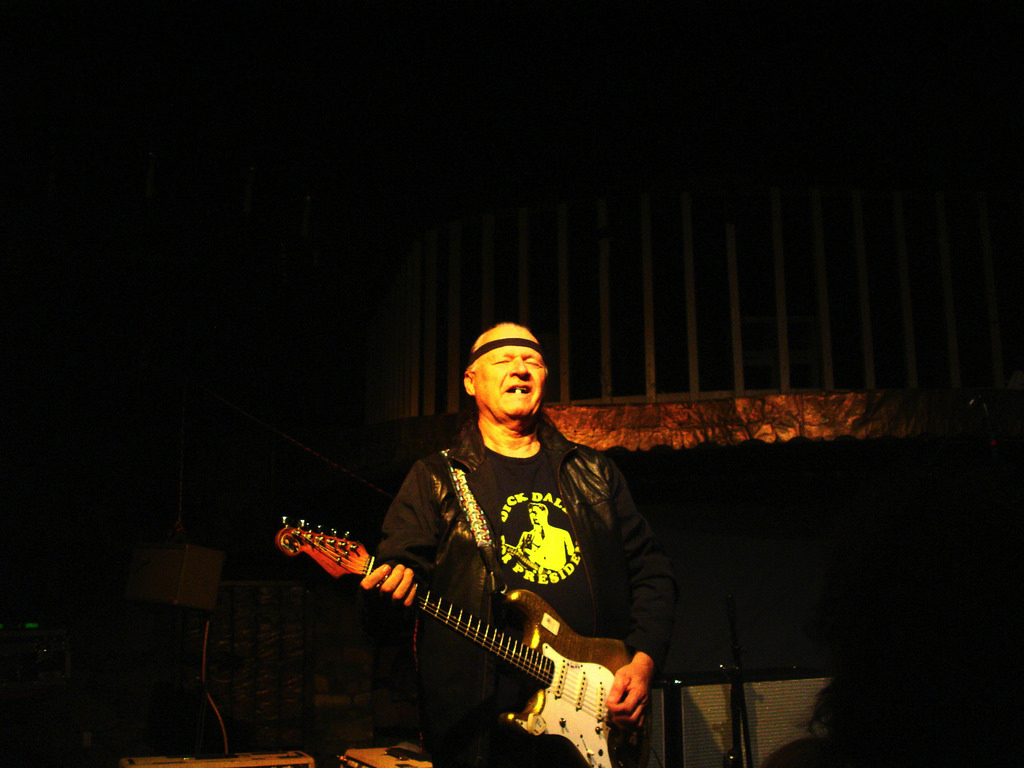Pioneering guitarist and progenitor of surf rock with “Let’s Go Trippin'” and “Miserlou” inspired generation of musicians

Guitarist Dick Dale in 2007. Photo: Mile Gehm/Flickr/CC BY 2.0
Dick Dale, “the King of the Surf Guitar,” has died at the age of 81.
California Rocker first reported that Dale died Sunday. His bassist Sam Bolle confirmed Dale’s death to the Guardian. No cause of death was revealed, but the guitarist suffered from health issues in recent years. In 2010, Dale said he was battling rectal cancer, and in an interview that went viral, Dale said in 2015 that “I can’t stop touring because I will die” due to medical expenses stemming from cancer treatment, diabetes and renal failure. “I have to raise $3,000 every month to pay for the medical supplies I need to stay alive, and that’s on top of the insurance that I pay for,” Dale said at the time.
As the progenitor of the surf rock genre and an innovator who helped stretch the possibilities of the electric guitar, Dale inspired musicians like Jimi Hendrix, Eddie Van Halen, Ry Cooder and the Beach Boys. Dale’s “Miserlou” also notably featured in the opening credits sequence of Quentin Tarantino’s Pulp Fiction.
Born Richard Monsour in Boston in 1937, Dale first played ukulele and then guitar as a child; Dale’s father, with Lebanese roots, taught his son the Middle Eastern scales that would later form the backbone of surf music.
After moving to Southern California as a senior in high school in 1954, Dale developed an obsession of surfing, ultimately combining his two passions and teaming with the Del-Tones to create tracks like 1961’s “Let’s Go Trippin’,” considered the first surf rock song, and the following year’s “Miserlou,” Dale’s take on an Eastern Mediterranean song; the Beach Boys would cover “Let’s Go Trippin’” two years later on their 1963 LPÂ Surfin’ U.S.A.
Dale defined surf music as “that rumbling and all that stuff like that they associated the heavy Dick Dale staccato”¦ it sounded like the barrel of a goddamn wave” in an interview with Surfer.
Dale was also recruited by the Fender company to test drive and help improve their instruments and amps; thanks to its association with Dale, the Fender Stratocaster became the go-to guitar for surf rock, with Dale’s signature golden Stratocaster dubbed “the Beast” a gift from Leo Fender, who custom-made the guitar for maximum volume.
“Nobody played loud, because there was no reason for them to play loud, so Leo [Fender] gave me one of his amps and told me, ”˜You go beat it to death, and tell me what you think of it.’ And I started blowing them up, and they would catch on fire. I blew up over 50 of his amps,” Dale told Surfer in 2010. “He would say, “Why do you have to play so loud?” but when I put it on stage, the people’s bodies would soak up the sound because I wanted my guitar to sound like Gene Krupa’s drums.”
Jimi Hendrix, like Dale, would play his Stratocaster left-handed. Eddie Van Halen would later cite Dale and surf music as one of his prime inspirations, with the Van Halen guitarist modeling his method on Dale’s quick-picking. Stevie Ray Vaughan, another disciple, would team with Dale on a cover of the Chantays’ surf classic “Pipeline” in 1986; the rendition would be nominated for Best Rock Instrumental Performance at the 1987 Grammys.
In addition to influencing a generation of guitar gods, Dale enjoyed a resurgence in popularity in the Nineties thanks to the placement of “Miserlou” in Pulp Fiction.
In 2015, Dale’s six-string peers named him one of the 100 Greatest Guitarists of All Time in a Rolling Stone feature. “His arrangements were really complex, really unruly,” Rush’s Alex Lifeson said. “It was all staccato strumming reverb, but with a reverb that just sounded so cool.”
“I’m not some great guitarist like the Satrianis and the Van Halens,” Dale told the Washington Post in 1993. “I never went to school and learned music theory. When I play, I go, ”˜This sounds like a tiger; this sounds like a volcano; this sounds like the lip of the water coming over my head when I’m surfing.’ My bass player says, ”˜When I stand behind you, I don’t just see your arms moving, I see your shoulders shuddering, your back straining.’ That’s because I put all my physical force into my playing. I take people for a ride on a non-chemical wave of sound.”
The Netflix livestream will broadcast from Seoul on March 21
The pop megastar is in search of love, ecstasy, enlightenment, and all sorts of fun…
In a recent interview with Apple Music’s Zane Lowe, the musician addressed the death of…
The singer appeared on Keke Palmer’s podcast to discuss her career and the difficulties of…
From the blood-soaked hallways of Hyosan High to the chaotic streets of Seoul, the battle…
The folk-pop artist brings multilingual dancefloor-ready songs and is ever the scene-stealer across four chapters…